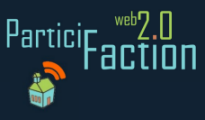Here's to the awesome 2009 People for Education Report! Entitled "Wanted: A Renewed Vision for Public Education," the document addresses the need for change in Ontario schools in order to better prepare our students for how their lives will be beyond high school.
Addressing everything from class size and declining enrollment, to principals' experience, to special ed., physical education and libraries, this is a serious look at what is working and what is needed to better the system.
Enter the section entitled "Educating for the 21st Century." Asserting that there is "a tidal wave of change approaching Ontario’s publicly-funded education system," the report goes on to talk about, in no uncertain terms, the importance (and inter-relatedness) of technology, innovation & creativity, and social connection; "For too long Ontario has been operating without a vision for education that is truly forward-thinking."
"Our educational model has looked pretty well the same for the last 160 years. If anything, over the last few decades, the model has become more, rather than less, restricted. It’s time public education caught up to the reality of the 21st century."
I like this, mostly because its true.
Now if we can just get governments, school boards, and teachers to take the implications of this report seriously -- and act on it's recommendations -- we'll be well on our way towards adequately preparing students for their likely futures...
Wednesday, June 10, 2009
Wednesday, June 3, 2009
Google Options!
Think you know Google? Unless you click "Show options..." and check out the awesome filtering and graphic organizing tools, you don't know Jack! The "Wonder Wheel" gives Clusty a run for its money, and then some!
Here's a demo.
Check it out!
Here's a demo.
Check it out!
One hour well spent...
Don Tapscott on the importance of understanding the cultural differences (and their implications) between today's Web 2.0 learners and those of the past.

Monday, June 1, 2009
"Teachers Online"... Really?
The June 2009 edition of Professionally Speaking, the magazine of the Ontario College of Teachers, has a promising headline: "Technology in the Classroom / Social Networks -- Teachers online." When I saw the cover I thought, "Wow! Finally an article on the importance of Web 2.0 to the classroom!" How prematurely silly of me.
The feature article is actually titled "Can We Be Friends? Watching your Electronic Step." Ah, yes... yet another warning to teachers about engaging in social media with students. I'd merely say "ho hum" and move on with my life, if I didn't get the nagging feeling that such articles are actually damaging to the futures of our students. Where are the warnings about what the futures of our students will be like if we do not engage in social media with them?
I read here, in bold lettering, that "When it comes to online social media and electronic communications, teachers often counsel students on how to operate safely and appropriately." Really? I don't know where author Stuart Foxman teaches (if he's a teacher) but I'd say such counselling is a rarity at best in my neck of the woods.
I read that "Web 2.0 will only grow and may well have a positive role to play in education." Fortunately, I love insightful understatements.
I read that "No doubt, teachers and school boards will continue to explore and wrestle with Internet usage and appropriate forms of teacher-student communications." This is likely true, if unfortunate and misdirected.
While it is (glaringly to anyone not living under a rock) true that all teachers need to be aware of the professional implications of everything that we do (whether online or offline, whether on the school day clock or not), we also have a responsibility to our students and their futures. Why not show them how we, as professionals, manage our Web 2.0 interactions? Why not lead by (shared) example? Why not offer a contemporary, "do as I do", example-based education, instead of an outmoded "do as I say, but you'll never see how I do" one?
The feature article is actually titled "Can We Be Friends? Watching your Electronic Step." Ah, yes... yet another warning to teachers about engaging in social media with students. I'd merely say "ho hum" and move on with my life, if I didn't get the nagging feeling that such articles are actually damaging to the futures of our students. Where are the warnings about what the futures of our students will be like if we do not engage in social media with them?
I read here, in bold lettering, that "When it comes to online social media and electronic communications, teachers often counsel students on how to operate safely and appropriately." Really? I don't know where author Stuart Foxman teaches (if he's a teacher) but I'd say such counselling is a rarity at best in my neck of the woods.
I read that "Web 2.0 will only grow and may well have a positive role to play in education." Fortunately, I love insightful understatements.
I read that "No doubt, teachers and school boards will continue to explore and wrestle with Internet usage and appropriate forms of teacher-student communications." This is likely true, if unfortunate and misdirected.
While it is (glaringly to anyone not living under a rock) true that all teachers need to be aware of the professional implications of everything that we do (whether online or offline, whether on the school day clock or not), we also have a responsibility to our students and their futures. Why not show them how we, as professionals, manage our Web 2.0 interactions? Why not lead by (shared) example? Why not offer a contemporary, "do as I do", example-based education, instead of an outmoded "do as I say, but you'll never see how I do" one?
Subscribe to:
Comments (Atom)



